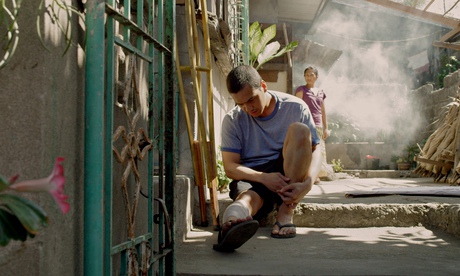
Innocence and punishment come together in this gripping Dostoyevskian epic from the Filipino director Lav Diaz: a gigantic four-hour saga composed with pellucid clarity and simplicity, and a kind of transcendental naturalism. This is a classical tragedy of the modern Philippines and of global capitalism, a story of violence, hate, fear and love spread out on a colossal panorama which extends its reach into the realms of the spiritual and the supernatural.
Diaz's camera depicts everything in pin-sharp deep focus. He appears to frame reality in every quotidian detail, even as it begins to merge into dreamlike unreality. The light in this film seems as clear and calm as a standing pool, and yet there is a blazing emotional turbulence in the picture too. It has a rapture – something weirdly euphoric, and is absolutely unlike anything else around, although you might draw parallels with the quietist achievements of Asian cinema such as Apichatpong Weerasethakul's Uncle Boonmee Who Can Recall His Past Lives, or Tsai Ming-Liang's What Time Is It There? and I Don't Want To Sleep Alone. Sergio Leone might have wanted to make his own version of Norte, The End Of History.
The Norte of the title refers to the Philippines' northern province of Ilocos Norte where a certain hothead student called Fabian (Sid Lucero) holds forth on the subject of atheism and anarchism to his long-suffering friends. The terms of the debate have evidently been set by the alleged "end of history": the absolute victory achieved by capitalism and western liberal democracy, famously hailed by the historian Francis Fukuyama in the late 80s, but now leaving Asia's developing world on the losing side. Fabian rages at the corruption and complacency of the Philippines' ruling classes and longs for some Napoleonic individual who — undeterred by the non-existent God and his meaningless sixth commandment — has the courage to carry out some violent revolutionary act.
As it happens, he is desperately in debt to the local moneylender, Magda (Mae Paner) – and so is Joaquin (Archie Alemania) a poor soul whose plans to open a roadside cafe, poignantly named after his children, have come terribly unstuck. Fabian, that sociopath, confuses the personal with the political and decides that the time for violence has come, but the subsequent horrific act is blamed on Joaquin. Yet it is Joaquin who enters into a mysterious state of grace in jail, while Fabian endures an unending calvary of horror while notionally a free man, in parallel with Joaquin's wife and children.
It is a compelling revival of that central idea from Dostoyevsky's Crime and Punishment: the horror, not of being murdered, but of being a murderer. It is the horror of realising that you might be capable of doing it. And if there is no God, and everything is allowed, there is a secondary horror — not of getting caught, but of getting away with it. As Fabian descended into his inferno of fear, I found myself remembering Martin Landau's Judah in Woody Allen's Crimes and Misdemeanors (1989) waking up in a cold sweat, unable to believe what has happened.
Joaquin and Fabian are shaped by economic imperatives: they have grown up in a dysfunctional state where market forces encourage the breadwinner to work outside the country and send money home. Fabian rages against the memory of his parents being absent, in Europe and the United States, and of being brought up by his maid. Joaquin's wife Eliza (played by Angeli Bayani, who herself interestingly played the exploited Filipina maid in Anthony Chen's film Ilo Ilo) recalls the early days of their marriage, when people told Joaquin to work abroad and create a good life for his family – but a fatherless life. If he had followed this advice, she concludes bitterly, he might not be in this situation.
In this film, spiritual agony and bewilderment fall like the rain on the just and the unjust. In prison, Joaquin receives friendship and compassion from a lifer who is a practised murderer, and who calmly says that he is no longer human. Joaquin himself is terrorised, like all the other inmates, by a swaggering prisoner-bully from whom, and with whom, he is to achieve a kind of redemption. His eerie, floating dreams range over his unhappy homeland, taking him back to his family, and his exalted dream state begins to achieve precedence. His subsequent liberation and reunion are extraordinarily moving. What incredible ambition: it is visionary film-making.
• More of Peter Bradshaw's films of the week

